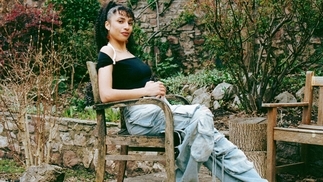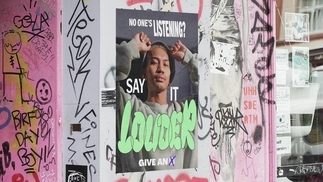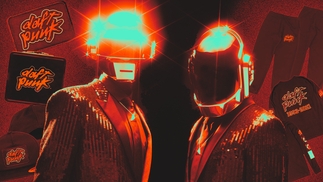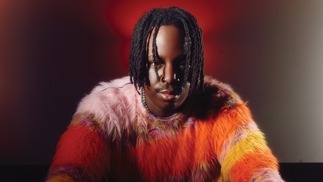Q&A LETHERETTE
Ninja Tune's most exciting new signing.

Letherette are Ninja Tune's most exciting new signing. With a funked-out style that fuses psychedelic electronics with soul snippets, house beats and hip-hop attitude, they're equal parts Madlib and Daft Punk. Ahead of their debut album, we linked to learn more about their attitude to sampling, French house, and what they think of today's music...
In the current climate of deep house dullards Letherette stand out like a sore thumb. Cutting 'n' pasting micro fragments of dusty old vinyl into emotive, pulsing electronic decoupages, their skewed, psych take on house and hip-hop acknowledges pioneers like J Dilla, Daft Punk, Cassius and Madlib, while injecting unexpected kaleidoscopic flourishes and live instrumentation, pushing sampladelia in a unique direction.
Their first album for Ninja Tune, 'Letherette', expands on the promise of their first few EPs for Alexander Nut's Ho-Tep stable. The single 'D&T' shreds an old Hall & Oates cut into a ludicrously irresistible hip wiggle, slaps it sizzling onto a pneumatic house backbone, and adds a funked-up guitar wig-out come the close; 'Cold Clam' is a tear-stained hip-hop ode of reflective, faded soul; 'Warstones' starts all Roule Records, before morphing into an oscillating techno ogre that could be Aphex Twin experimenting with 4/4, and indeed, Letherette seem destined to generate a serious cult following of their own.
A production duo from Wolverhampton, Andy Harber and Richard Roberts met at school and have been mates ever since. Sharing a love of house and hip-hop, and their sampladelic cut 'n' paste aesthetic, they learnt to DJ in the late '90s inspired by their older siblings' own adventures in dance music, before cementing their own identities, and beginning to work seriously together on music in the mid-2000s. We got in touch with Richard to find out more...
What got you into dance music, and how'd you end up working together?
“My brother used to DJ, back in the '90s, so every week he would come home with a bag full of new records. A lot of it wasn't to my taste, (certainly back then anyway), but I remember seeing a Roule record in his collection, I think it was either 'Vertigo' by Alan Braxe, or 'Hello My Name Is DJ Falcon' by DJ Falcon.
I just remember playing it and it blowing my mind. It wasn't until later that I found out the association with Thomas Bangalter and Daft Punk, who I was already a fan of. From this, I then started buying Crydamoure records and Cassius, anyone that was associated with 'French house', so this was kind of when I personally fell in love with house music. It was at this point we both started mixing records that we liked on my brother's decks.
“We both started making electronic music during the late '90s. Back then, we'd just buy gear that we thought looked interesting or that was used by producers we admired. We had an old Realistic synth made by Moog, and various guitar pedals and drum machines, we even circuit-bent old equipment. We'd then just sit in Andy's room and play around with them. We'd stick in a fresh Minidisc, press record and just jam until the disc was full. it was really self indulgent and aimless, but that didn't matter, because we were totally engrossed in what we were doing. We were learning, I suppose, and it was invaluable.
“It wasn't until around 2005/2006 that we decided to join forces. Because our tastes and influences were so similar, a lot of the stuff we were making was similar too, so it made sense to combine what we had into one outlet. Plus, it was great to be doing something with your best mate!”
Your name is interesting — a surrogate material that reproduces real leather. Does this relate to the way you sample and reconstruct your music from existing materials, in this case, sampling other records?
“Maybe, in a kind of indirect way. Letherette was originally the name of a track Andy had written. I remember it well, it was just super sexy and catchy.When he told me it was called 'Letherette', I just laughed because I just felt it suited it so much. The way he'd taken an old record and made it sound sexier by the way he'd chopped it just seemed to fit the name, so we decided to call ourselves Letherette.
With the name fitting to the music we were making, it kind of outlined a narrative that we wanted to attach to the name, especially with the images we used to coincide with the music.”
When you started out your music sounded far more related to hip-hop, but you've moved closer to upbeat house sounds now. Why?
“We've always made house music , but for a while we saw Letherette as an outlet for our hip-hop stuff. It was a conscious decision to let go of that barrier and just see Letherette as a means to show all of our styles and influences. Even though the style of the music wanders and changes, we always want it to sound like Letherette.”
On 'D&T' there's a live guitar solo, but the rest of the music is hooked around those prominent samples. To what extent is your music sample-based now? Do you feel a mix of live instrumentation with the samples is important?
“Not necessarily. we've always just worked on the premise that if it sounds good and gets us going in some way, then just go with it, whether it's sampled or not. When you're writing something with samples, you might get to the point where you start having different ideas about where to take the track, and for 'D&T', the idea of someone shredding along to the end section just made sense! On the album we play a lot of instruments, from guitars to synthesisers and various percussion instruments. We sampled a lot of the instruments we played in ways that made it sound more knitted in with the overall production.
So some things that you might think are samples from records, are actually samples of ourselves. “With sampling, there's just so much you can do, from the obvious to the more intricate. The complexity is in the selectiveness.”
Obviously that tune uses a Hall & Oates sample which some would consider cheesy but you've transformed it. Is that one of the benefits of sampling, how sounds can be transformed when put in a new context?
“We love that Hall & Oates tune! But yeah, totally, we've always loved the idea that you can take the naffest track imaginable [and] sample certain parts to transform it into something you think is amazing. It's like you uncover a secret, in a way. The track was always there within the details of the record, and you unlock it with sampling.
“Sampling gives you an outlet to create. For example, not everyone can afford to buy a Wurlitzer, but you could sample one from a record, and with that, the possibilities can become endless in terms of being able to process that sound and create something original.”
You mentioned your love of French house. Was it the sampling that got you into it? That cut 'n' paste aesthetic?
“The sampling style was definitely an influence, whether that was taking a chunk of a record you thought was great, and looping it, or getting right in there and chopping it to pieces and then arranging it in a way you thought was pleasing. We were really blown away by 'Hi-Fidelity', on 'Homework'. That track was hugely influential. The sampling style between hip-hop and house music is generally the same process, it's only the difference in the tempo of the track that affects what it's labeled as.”
Do you feel there's something lacking in today's scene? Who do you consider to be contemporaries working in a similar area? Who are some of your heroes?
“Our aim was always to sound true to ourselves as producers, Letherette to us is more than just music, it's style, friendship, experiences, it's us. If it sounded like another artists, it wouldn't be Letherette. Having influences is important to progress as an artist but I suppose sometimes, especially with trends in music, it can sound similar or generic in ways. For us the artists that stick out from the rest are usually making music that has a style or sound that is unique in some way to them.
People like J Dilla, MF Doom, Madlib, Inc, Beach House, William Basinski, Todd Edwards ... not necessarily all house producers, but producers that have a style that is very reflective of them, and distinctive. I think if you produce music and are only influenced by artists that produce one or a similar type of music, it's hard to 'spread your wings' musically, so to speak.”
How do you approach your production? How do you find samples?
“Production is very important to us. With production, you can make an ok track sound amazing. We spend a lot of time producing music. Usually the essential part of the track can take a day, but the production can take weeks or months.
For example, 'After Dawn' was made in a few days, but the production of the drums took months of trying different drum layers, EQs, reverbs, compressors... we know what we want to hear in a track and we don't compromise, if it isn't there we don't release it. With samples, for us it's just a case of listening to a lot of stuff, and having a lot of music.”
Did the sampling lead you back to an appreciation of the original tracks?
“I suppose the music we sample in someway can determine the feeling of a track, not always but if we sample a track there's always something about the track that draws us into it. We don't personally venture out to hold what we sample to its origins, usually it's the atmosphere or a sound that we could no way create now. Everybody wants to sound like some old band or someone in the past, but it's an impossible venture in some ways. Sampling can open doors to past production, and also help create something unique in today's music. It also helps us learn production techniques.”





